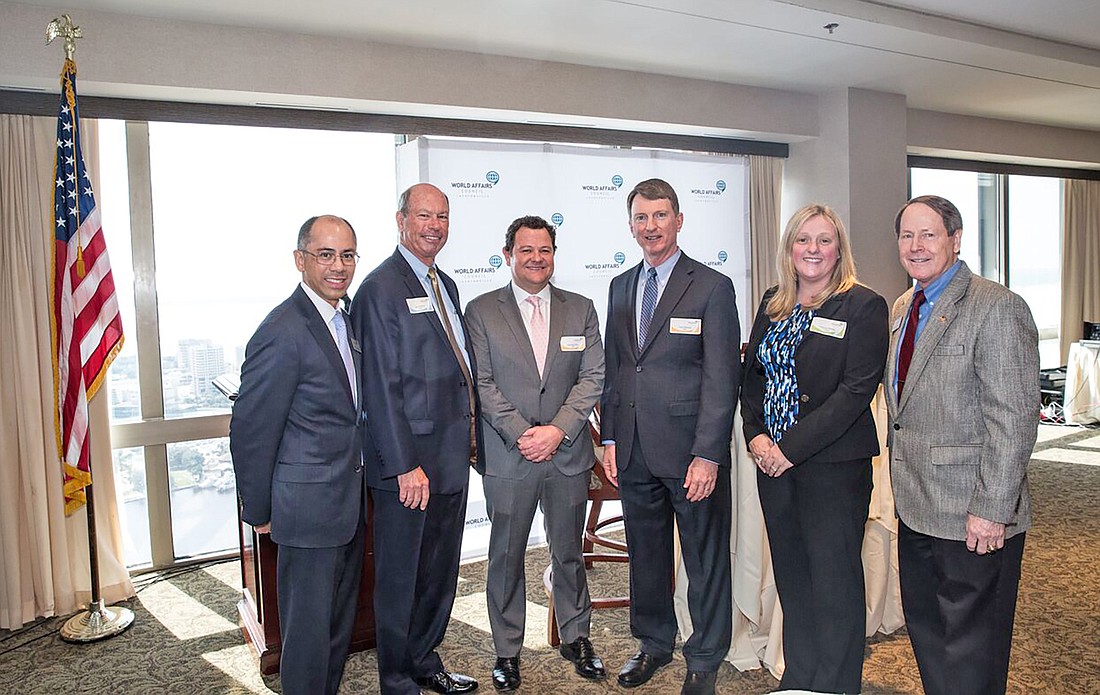
As businesses look for sites to expand or relocate operations, they consider a number of common factors in every city, including the available workforce, real estate and possible financial incentives.
But sometimes, a small detail can make a big difference.
When Australia-based Macquarie Group was looking for a site in the Eastern U.S. for a finance support group, it narrowed the choices to Raleigh, North Carolina, and Jacksonville.
When company representatives visited Raleigh, local officials rented a Ford Expedition to show them around town, said Anthony Glenn, head of Macquarie’s Jacksonville office, during a panel discussion Tuesday to the World Affairs Council of Jacksonville.
However, when the group visited Jacksonville, local officials provided a helicopter to show off the community, he said, drawing chuckles from the luncheon crowd at The River Club Downtown.
“You laugh, but that made a huge impact,” Glenn said.
Macquarie opened its Jacksonville office in 2016 with the help of $393,600 in city and $1.37 million in state incentives.
“That (incentives) was a draw, don’t get me wrong,” Glenn said.
However, “it really comes down to how well you could sell your city.”
Glenn was part of a panel discussing on what it takes to bring international companies to Jacksonville.
Jerry Mallot, recently retired president of JAXUSA Partnership, said businesses look at several factors in picking a city before applying for financial help.
“Incentives become important at the end,” he said. JAXUSA is the economic development division of JAX Chamber.
Cities have to demonstrate they can meet a company’s other needs, like labor and facilities. And, they need to respond quickly, Mallot said.
“We wouldn't have Amazon here if we couldn't move quickly to meet their needs,” he said.
Amazon opened two fulfillment centers in Jacksonville in 2017 and 2018.
For Saft America Inc., the quality of the workforce was a big factor when it decided to build a lithium-ion battery plant in Jacksonville in 2010, said Jody Beasley, general manager of the plant.
France-based Saft already had a plant and available space in Valdosta, Georgia, but it needed workers with specific technical skills that the company thought would be difficult to attract to a small town.
“Jacksonville became much more attractive in that way,” Beasley said.
The large number of retired military personnel in Northeast Florida also bring skills to a facility like Saft.
“Veterans available in this area in the workforce was a big plus, “he said.
Scotland-based City Facilities Management (US) LLC, formerly known as City Refrigeration, came to Jacksonville in 2016 to provide facilities management services for Jacksonville-based supermarket operator Southeastern Grocers.
“We build our business where our customers are,” said Tracey Hulsey, chief finance officer for City Facilities Management.
Having major headquarters operations like Southeastern Grocers creates a “ripple effect” of supporting businesses attracted to the area, Hulsey said.
“The big fish need all these little fish to support them,” she said.
Jacksonville has positive attributes, including a lifestyle and climate that helps recruit businesses. However, the panelists said one glaring need is a more vibrant Downtown area.
Glenn said Downtown development makes an impression on business leaders who make relocation decisions. But it’s also important to attract younger workers who prefer an urban lifestyle, he said.
“They just expect a different lifestyle and we're not offering that as well as we can do,” Hulsey said.
Some issues for international companies are out of control for Jacksonville recruiters, such as the current uncertainty over tariffs in international trade.
“Quite honestly, we hope it's going to be resolved but it is a big question now,” Beasley said.
Immigration concerns are another issue.
“It has become trickier to get visas,” said Hulsey, as international companies bring in experts from their home countries to help set up operations in Jacksonville.
Mallot said China-based solar panel manufacturer JinkoSolar Holding Co. Ltd. faced that problem as it brought in people to help set up its Jacksonville plant.
“It became very frustrating. I know that's an issue,” he said.
Hulsey’s company has had issues with IT experts from its home office facing tough scrutiny from immigration officials when they arrive in the U.S.
“They are finding increasing pressure at the border,” she said.
“It is very unnerving for a business professional.”